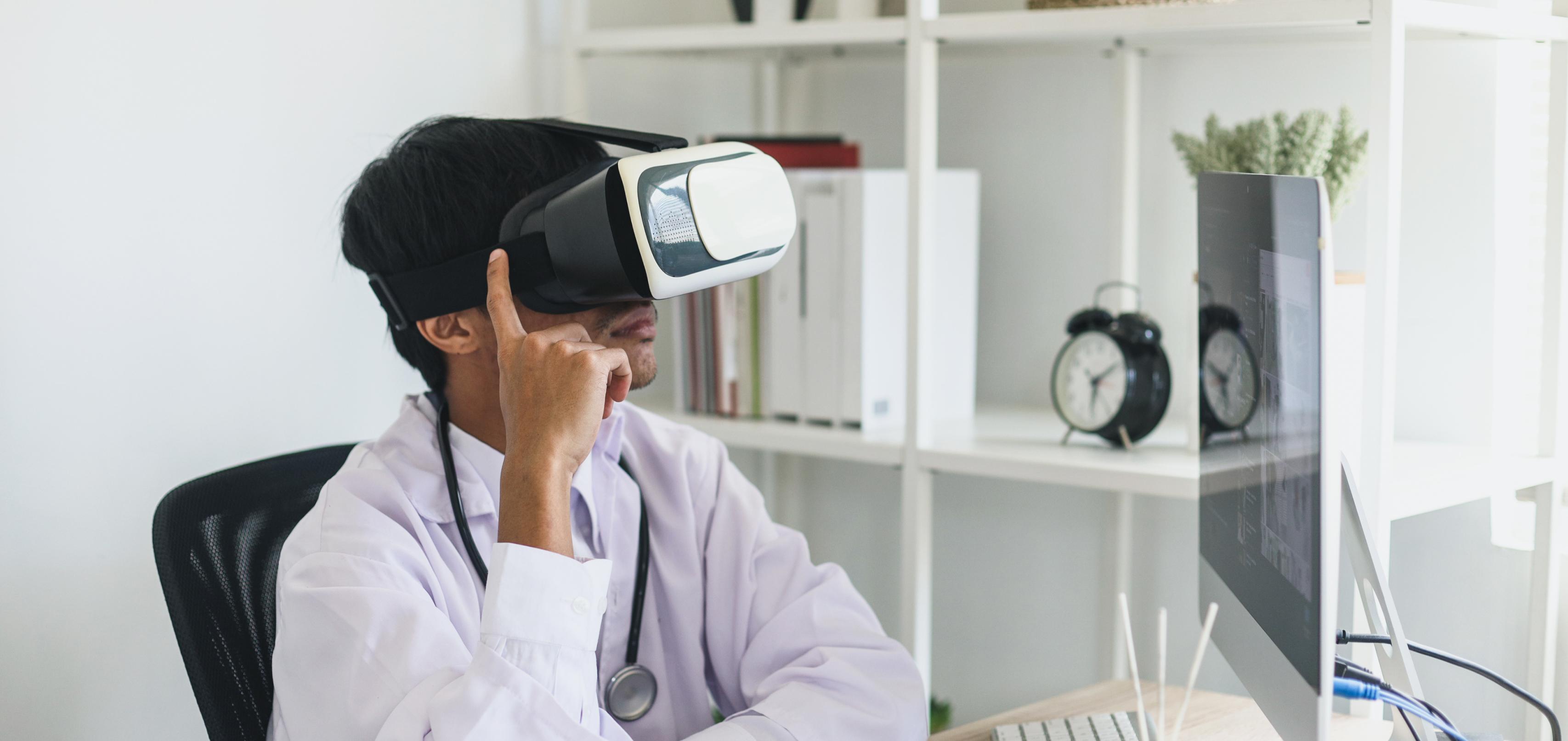Virtual reality healthcare solutions
Our extensive experience in creating virtual reality solutions has shown us that VR applications play a transformative role in healthcare, offering cutting-edge solutions that reshape patient care, medical education, and therapeutic strategies. At Vention, our mission is to empower healthcare organizations to harness the full potential of VR technology.
Impact of VR on the healthcare market
Market analysis and statistical data show the significant impact of the surge in VR investment on transforming the healthcare industry:
As per Fortune Business Insights, in 2022, the global market value of VR in the healthcare industry exceeded $2.3B. It's projected to experience substantial growth by 2030 and potentially reach over $25B, marking a remarkable CAGR of 34.9 percent.
VR’s segment on the healthtech market
From 2022's valuation of $2.4B, the global VR market in healthcare is anticipated to climb to $19.7B by 2032. This growth, occurring over the forecast period from 2023 to 2032, represents an impressive CAGR of 24.1 percent.
Geographic distribution of the VR market
Regarding the regional distribution of the VR in the healthcare market, North America is projected to dominate with the largest market share of $890M in 2022.
Benefits of VR solutions in healthcare
Virtual reality for healthcare offers a wide array of benefits that enhance experiences and outcomes for both patients and medical clinics. Let’s explore how VR technology is revolutionizing patient care and clinic operations:
Benefits of VR solutions for patients
Improved treatment and rehabilitation
Virtual reality notably improves cognitive and physical rehabilitation. It offers immersive simulations for patient therapy, mirroring real-life scenarios for more effective recovery and skill development. This approach outperforms traditional methods in interaction and engagement.
Real-time treatment tracking
VR provides an invaluable tool for patients to observe their treatment progress in real-time. This immersive experience significantly boosts engagement and dedication to their health journey.
Enhanced safety
VR creates a secure environment for healthcare professionals to practice complex surgeries, reducing errors in actual operations. It also serves as a non-invasive educational tool, which improves the understanding of medical treatments for both patients and medical staff.
Wide-ranging treatment
VR therapy is a pioneering method for treating a range of conditions such as anxiety, depression, and sleep issues. It utilizes immersive technology for effective, personalized treatment.
Improved access to therapy
VR therapy offers the convenience of extra therapy hours beyond what in-person providers can typically give, which eliminates travel to medical facilities and makes it easier to fit into busy schedules.
Education and empowerment
Interactive VR settings enable patients to learn more about their health conditions and treatments, enhancing understanding and empowering active participation in healthcare.
Benefits of VR solutions for healthcare organizations
Boosted medical education
VR allows medical students to learn anatomy in an immersive environment and practice emergency scenarios without risking anyone's safety or well-being.
Marketing and presentation
VR offers healthcare companies, especially those dealing with medical devices and equipment, a platform to demonstrate complex concepts and introduce new products in an immersive, virtual setting.
Reduced cost
Virtual reality offers a more cost-effective solution for training medical professionals and conducting research. For instance, VR can reduce reliance on sedation during painful treatments, which can be costly and carry side effects.
Enhanced diagnostic accuracy
Utilizing immersive 3D visualizations, VR technology provides healthcare professionals with an in-depth understanding of medical conditions. This improved visual capability aids in more precise diagnoses and better patient outcomes.
Patient satisfaction
VR therapy offers interactive, sensory 3D experiences, increasing patient comfort and adherence. Healthcare providers can adjust treatments based on observed responses in these settings.
Increased accessibility
VR enables institutions to offer medical services and training in remote or underserved areas, increasing healthcare accessibility.
How VR is used in healthcare
Healthcare professionals are actively exploring captivating applications of VR to enhance patient care and improve treatment outcomes. These innovative uses of VR span from surgical procedures and pain management to physical and cognitive rehabilitation.
VR offers cost-effective and standardized training on demand, greatly enhancing learning experiences and fostering empathy among physicians. By utilizing virtual headsets and controllers equipped with haptic feedback, learners can engage in fully immersive simulated experiences. This approach is increasingly popular in medical schools, as it provides an engaging alternative to traditional learning tools such as books and computer screens.
VR platforms enable students to practice procedures repeatedly without any real risks, which enhances their understanding of complex anatomical structures. This technology is particularly beneficial for training skills such as suturing, ultrasound, and nursing procedures.
Virtual reality technology is pivotal in aiding surgeons with both planning and performing surgeries. It provides 3D guidance during operations, allowing surgeons to rehearse and perfect procedures in advance. This holds particularly true for laparoscopic surgery, as VR training has been demonstrated to augment surgical precision.
For example, Vicarious Surgical, a robotics startup, is pushing these boundaries further by integrating human-like mechanical arms enabled by VR technology. These are crafted to help surgeons in complex tasks like dissections and suturing, offering better access during abdominal surgeries.
VR is revolutionizing ophthalmology in several areas, including medical training, surgical planning, low-vision rehabilitation, research, and enhanced diagnostics.
It's particularly effective when combined with traditional vision therapies for treating binocular vision disorders such as strabismus, amblyopia, and convergence insufficiency.
Mental health treatment
VR technology is used to aid in stress relief, anxiety reduction, and fostering a more peaceful mental state through therapeutic simulations. VR headsets allow therapists to create scenarios that are hard to replicate in real life, such as multiple flights in one session for exposure therapy or practicing anxiety management in a bustling virtual shopping center.
Originally rooted in exposure therapy for phobias, panic disorders, OCD, PTSD, and traumatic brain injury, VR in mental health has expanded to include a broad spectrum of applications. These range from psychoeducation, relaxation techniques, and addiction treatment to mindfulness interventions, social skills training, and managing symptoms of depression and anxiety disorders.
Treatment of neurological diseases
VR has shown great promise as a therapeutic tool for a range of neurological diseases, including epilepsy, dementia, Alzheimer's, Parkinson's, ALS, and Bell's palsy.
Recent research indicates that VR therapy provides a pleasurable treatment experience and leverages the brain's neuroplasticity; this can enhance neuron and nervous system functionality, boost cognitive abilities, and alleviate symptoms.
Patient rehabilitation
VR offers a captivating, immersive, and challenging rehabilitation experience through gamified therapy. This approach proves highly effective in neurorehabilitation for stroke recovery, enhancing balance and coordination post-stroke. It also holds significant value in post-operative therapies.
VR applications also empower patients to follow personalized training programs, which therapists can customize and monitor. Therapists possess the flexibility to adapt these programs as necessary and can even virtually participate in VR sessions as instructors.
Pain management
VR's non-invasive, drug-free approach not only distracts from physical discomfort, but also helps manage stress and chronic pain more effectively. Its immersive nature has been proven to reduce opioid use — especially in treating acute pain post-surgery or injury.
The desired effect is achieved by incorporating narrations that skillfully guide users through immersive environments. These narrations are combined with techniques such as breathing exercises and cognitive redirection, which results in pain reduction.
Pediatric diagnostics and treatments
VR is revolutionizing how children experience medical procedures by providing a powerful distraction from the discomfort and fear associated with treatments like blood tests and flu shots.
The use of VR in pediatric healthcare offers a more comforting and less intimidating environment and makes medical visits less stressful for both children and their caregivers. It’s a gentle approach that turns potentially traumatic experiences into manageable and even engaging moments, paving the way for a more positive association with healthcare from an early age.
VR in dentistry
Virtual reality offers significant benefits to both dental patients and practitioners. With VR headsets, patients can alleviate the stress associated with dental procedures and achieve a relaxation state. VR serves as an effective form of distraction and provides comfort and ease to patients during their visits.
For dental professionals, VR serves as a valuable tool for interactive learning and training. It provides realistic simulations for dental treatments, anesthesia administration, and specialized programs for addressing dental phobias.
Our VR technology stack
By harnessing the latest in VR technology, we help you create immersive and innovative experiences that transform the healthcare industry.
VR headsets
Oculus Rift
HTC Vive
Windows Mixed Reality
Oculus Quest 2
Samsung Gear
VR engines
Unity 3D
Unreal Engine
3D modeling and animation
Autodesk MAYA
Blender
Autodesk 3Ds Max
AI/ML
NumPy
Open NLP
Azure Cognitive Services
Google Cloud AutoML Vision
IBM Watson
TensorFlow
Libraries and frameworks
ARCore/ARKit
OpenVR
Google VR SDK
Amazon Sumerian
Oculus SDK
SteamVR
RajawaliVR
Babylon.js
WebVR/WebXR
A-Frame
React VR/React 360
Vuforia
Backend
.NET
Golang
Elixir
PHP
Node.js
Scala
Java
Python
Virtual reality in healthcare: real cases
Virtual reality in healthcare has seen several real-world applications, showcasing its potential to transform medical training, treatment, and patient care. Here are some notable use cases:
Fundamental Surgery offers a scalable, portable, and collaborative solution that empowers businesses to deliver highly effective training programs for healthcare professionals. They seamlessly combine the simplicity of standalone, off-the-shelf VR devices with the precision of HapticVR™ — all while maintaining the utmost training quality.
FundamentalVR empowers medical companies with precise and immersive VR training simulations across various fields, including orthopedics, medical devices, ocular gene therapy, and ophthalmology.
Another successful example of leveraging the power of VR implementation is the Johns Hopkins School of Nursing. Developed in partnership with Oxford Medical Simulation, this VR software offers two forms of experiences: on-screen via a computer and immersive using an Oculus headset. The program has enabled the training of about 400 students.
The AI-powered VR scenarios present various medical emergencies where students virtually diagnose and treat patients. They use Oculus controllers or a mouse to interact with patients and medical equipment in the simulation.
After completing a scenario, students receive detailed analytics on their performance. This training not only enhances their critical thinking skills, but also allows them to practice in high-risk situations without the danger of harming real patients.
Hear from our expert
Hear from our expert
VR services we offer
When virtual reality healthcare solutions are executed with precision and expertise, they can transform the landscape of medical treatment. This is precisely the kind of transformation we can bring to you.
VR strategy development consulting
Our team comprises skilled VR specialists who are fully equipped to support both current and future VR projects. If you struggle to give your patients and medical staff the best possible service, we're here to upgrade your existing system or advise on the best technology and design tools to enhance your offerings.
Our consulting services encompass thorough market analysis, comprehensive technology advisory, UI/UX consulting, and meticulous implementation planning, including a discovery phase to ensure a tailored approach to your VR development needs.
VR application development services
Vention specializes in VR development for healthcare, offering everything from design to refinement. Our services include user-focused design, 3D modeling, interactive content, and easy integration with your systems, all tailored to your needs.
-
Solution architecture design
-
UI/UX design
-
3D modeling and interactive content development
-
VR software development
-
Custom software and hardware integrations with healthcare systems
-
QA and testing
-
Continuous support and modification of existing VR software with new features
Are you ready to revolutionize your healthcare solution with VR?
Our developers are fully equipped to assist you in building your VR solution from the ground up or enhancing an existing one.
We build VR healthcare solutions for...
Healthtech startups and product companies
We turn innovative ideas into tangible results, helping healthtech startups and product companies improve patient outcomes globally. Our VR healthcare solutions provide advanced training and therapeutic experiences, revolutionizing medical practices.
Medical schools and universities
We create VR solutions for medical education that offer a realistic, safe, and controlled learning environment. Our VR-based software helps medical schools implement more effective and safer training methods, benefiting both students and patients.
Hospitals and healthcare providers
Our specialized team crafts VR solutions tailored to modernize healthcare practices, offering medical professionals and their patients cutting-edge, immersive therapeutic experiences in a secure setting.
Rehabilitation centers
We design custom VR solutions for rehabilitation centers to optimize treatment protocols, speed up patient recovery, ensure adherence to therapy, and facilitate a smoother reintegration into daily life.
Pharmaceutical companies
Our VR solutions provide researchers with crucial insights into human anatomy and diseases, enabling the simulation of clinical trials for safe testing of new treatments without human risk.
Telehealth providers
Responding to the expansion of telemedicine, our VR solutions equip telehealth providers with tools to revolutionize remote healthcare. Our technology enhances interaction and increases diagnostic precision, leading to better healthcare outcomes and a more personalized approach.
Why work with Vention
Top-level security
-
Compliance with HL7, HIPAA, GDPR, and PCI DSS protocols
-
Secure engineering practices
-
Detailed updates on your healthcare solution
Client-oriented approach
-
Mount Sinai, Dialogue, and Thirty Madison are among our top clients
-
Engagement models tailored to every client
-
Clear and open communication channels
Rich expertise
-
20+ years of experience
-
3k+ world-class engineers
-
30+ business verticals and 25+ technologies
Our ISO 27001 certification reflects our unwavering commitment to top-tier information security management. Trust in our proven framework to ensure data confidentiality, integrity, and availability.

Testimonials
At Vention, our mission is to deliver healthcare solutions that serve both patients and therapists effectively. We're committed to ensuring every digital treatment meets the requirements of both parties. But don't just take our word for it — check out our client reviews on Clutch.co.
VR software development FAQs
What are the key cost factors that impact the pricing of VR solutions in healthcare?
The cost of implementing virtual reality solutions in healthcare primarily depends on factors such as the project's complexity and scope, the need for custom software development, hardware expenses, and the availability of resources.
Other factors include the cost of VR headsets, the complexity of content, integration requirements, the technology stack used, and the app's specific features. The project timeline is another crucial aspect influencing overall expenses.
Our team can provide an accurate cost estimate for your VR project within 24 hours.
What are the primary difficulties in implementing VR technology in healthcare? What strategies can be employed to overcome these challenges?
The key barriers to introducing VR in healthcare include high costs, insufficient infrastructure, and restricted hardware availability. To address these issues, utilizing cost-effective, off-the-shelf technology solutions can reduce upfront expenses. Optimizing current infrastructure and implementing uniform standards and guidelines across the industry can also simplify the adoption process.
To remain at the forefront of innovation, healthcare organizations are increasingly hiring dedicated IT staff skilled in virtual reality applications and platforms. Any company should keep abreast of evolving VR technologies and consider collaborations with seasoned companies adept at tailoring their offerings to clinical environments. It's essential to recognize that the benefits of effective VR implementation will often surpass the initial investment made.
What essential elements ensure effective VR implementation in the healthcare sector?
The successful adoption of VR in healthcare hinges on understanding the technology's potential, selecting appropriate hardware and software, and a well-planned implementation strategy. Don’t forget comprehensive training for clinicians and personnel, detailed documentation for maintaining performance standards, and consistent IT specialist support.
Most importantly, patient safety and comfort with VR systems must be a top priority, which requires thorough pre-deployment testing of any new technology.










